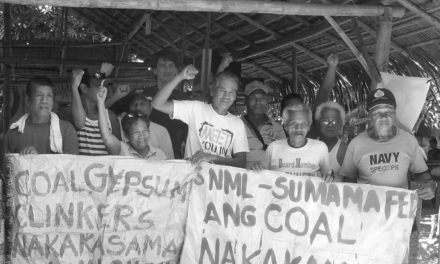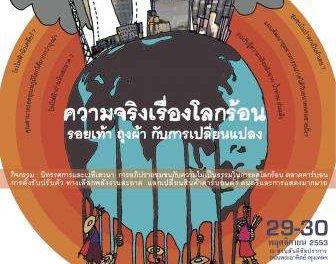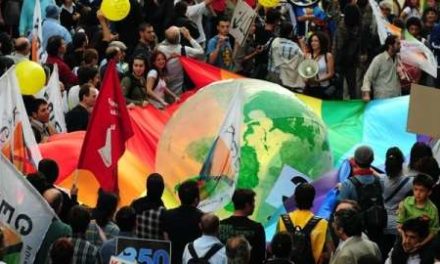by Joseph Purugganan
Despite the rhetoric on “moving the world toward low-carbon development” (1) it is clear that the transition to the green economy rests on maintaining and protecting the status quo when it comes to the economic development model. This is clearly evident in how the trade and investment agenda and the preservation of the existing economic governance system are being pursued in the context of the green economy.
The language on trade in the negotiating document for the Rio+20 Conference shows that en route to the “future we want” (2) the neoliberal paradigm of free trade would remain largely unchanged/ untouched.
Perpetuating a regime of inequalities
In effect what the so-called green economy would be preserving is the current unjust system of global trade and investments governed through a set of rules and principles embodied in a constellation of multilateral, plurilateral, regional and bilateral trade and investment agreements.
These comprehensive and ambitious free trade and investment agreements have been criticized across Asia and the globe for their negative impact on jobs and livelihoods, the erosion of policy space, for giving more powers to corporations especially in terms of access and control over natural resources and the environment, for perpetuating the over-exploitation of natural resources for export, and for undermining the right to food and health (access to medicines). Furthermore, these agreements are negotiated with very little transparency and public participation.
Pushing the limits
According to the global network Our World is not for Sale (OWINFS) , these “international trade and investment agreements are a driving factor as well behind the growth of energy-intensive industrial sectors, the continued extraction and processing of fossil fuels, and the expansion of intensive agriculture.” (3) The OWINFS report adds that “these carbon-hungry activities also contribute to the relentless destruction of climate-regulating forests; and international transport is responsible for a significant chunk of annual greenhouse gas emissions.” (4)
Free trade agreements (FTAs) have also become a weapon in the growing conflict over resources. Securing access to cheap raw materials has spurred a “resource war” among developed countries whose competitiveness is hinged on these inputs and this has, in turn, fuelled the agenda to eliminate export restrictions to facilitate the trade in raw materials.
Asia is right in the middle of this global “struggle to grab valuable resources.” (5) A recent publication of the Asian Development Bank cited that “in 2005, Asia’s voracious appetite for raw materials hit a world-leading 35 billion tons (and could hit) a staggering 80 billion tons by 2050. The region’s soaring demand for energy is similarly insatiable.” (6) China is a major player in the trade of raw materials both as huge buyer of oil, gas, timber and minerals as well as the world biggest exporter of ‘rare earth’ minerals which are crucial to the manufacture of many hi-tech products. (7)
The ‘resource grab’ is also evident in the way corporations have tried to secure access and control over genetic resources as an important component of the bio-based economy. The prevailing trade and investment regime has entrenched control over technology in the hands of a few.
The WTO’s trade-related intellectual property rights (TRIPS) agreement has set a minimum standard guaranteeing protection for rights holders to IPRs. IPR chapters in bilateral and regional FTAs have used the WTO TRIPS regime as a convenient anchor for pushing TRIPS plus provisions that secure even more protection to IP rights holders. This restrictive IP regime has been challenged by various groups and movements from farmers to patient’s networks and public health advocates across Asia for curtailing rights to food and health.
FTAs have now also become the preferred instrument for both opening up markets for investments and at the same time enhancing investor protection. The European Union for example specifically mandates investment negotiations be conducted as part of broader trade negotiations, where the EU would seek to obtain binding commitments from its partners that guarantee and protect the free flow of all forms of Investment. (8)
Trade in the transition
The basic agenda on trade in the Rio+20 negotiating document, which identified trade as one of the four means of implementing the transition to the green economy, revolves around the following key goals: (a) ensuring that the transition to the green economy does not create new trade barriers; (b) for members to redouble efforts to achieve a universal, rules-based, open, non-discriminatory and equitable multilateral trading system and for an early balanced, ambitious and development-oriented outcome of the Doha Development Round of multilateral trade negotiations, (c) identifying and seizing new export opportunities, including those created by the transition towards a green economy, and (d) creating an enabling environment for investments are essential for sustainable development
With these goals as starting points, developed countries have used the Rio+20 conference to emphasize their strong positions on “the need to resist protectionist tendencies and to rectify and trade distorting measures” while reaffirming the importance of increasing market access for developing countries products and services.” (9)
This emphasis on the threat of protectionism is a throwback to how developed countries and multilateral and regional institutions responded to the global economic crisis and its impact on world trade. In the wake of an unprecedented contraction in global trade, estimated at around 8-10 percent in 2009 according to UNCTAD, the solution that was put forward was not a retreat from liberalization but rather a further opening up of world markets. In other words, exporting our way out of the crisis continues to be the mantra.
An overarching concern is that the transition to the green economy should not disrupt or undermine the system that is already in place. There can be no turning back from the export-led model of development in fact opening up a new area of green exports has become an imperative. And there should be no talk of revamping the free trade agenda as embodied in the FTAs, even if there is growing evidence to show the negative effects of these agreements on developing countries.
Asian consensus on green trade
Despite widespread criticisms from various sectors across Asia against FTAs, Asian governments have generally taken a position in support of the green economy and the preservation of the existing free trade and investment regime. They articulate concerns over the erosion of policy space and the loss of flexibilities for developing countries to “make their own choices out of broad menu of options” to define their own path towards sustainable development, (10) and their emphasis on the need to reflect the disparities between developed and developing countries in accordance with the principle of common but differentiated responsibility (CBDR) (11) but share a common view on the role that trade will play in the green economy.
The emphasis is for green economy options that are consistent with a fair, open, equitable, rules-based, non-discriminatory multilateral trading system which ensures market access for developing countries, levels the playing field through the elimination of producer subsidies and export subsidies for agricultural products in OECD countries and the removal of tariff escalation and non-tariff barriers affecting labour intensive exports from developing countries; ensures the effective enforcement of the special and differential treatment provisions of the WTO; and narrows rather than widens the technology gap between developed and developing countries.
Even in the area where there is a clear unanimity among Asian countries on the issue of what has been referred to as “green protectionism, the strong emphasis is on “new trade opportunities.” (12) A clear component of this so called green growth agenda is what countries like South Korea are pushing in terms of the creation of “eco-friendly growth engines” based on a new market system which encourages public and private green funds and green technology, market-friendly regulations, green purchase and procurement, as well as a balanced distribution system of wealth for poverty eradication. (13)
Asian governments are aggressively pushing for new markets for environmental services and in order for payments for these services to be made, they are pushing for the establishment of mechanisms to capture and account for the economic, environmental, and social value of natural resources. (14) Nepal for example has called for the establishment of more “favourable conditions for improving markets for mountain ecosystem goods and services and for inclusion of equity concerns in the green economy in hills and mountains, and the promotion of low-carbon socio-economic development by creating green jobs and environmental services related businesses such as REDD+.” Payment for environmental services to improve human well-being and social equity is also on the agenda of the Philippine government for Rio+20.
Conclusion
Trade is envisioned to play a significant role as one of the four overarching tools to effect the global transition to the green economy. The discourse and the agenda on trade however have very narrowly focused on combating the threat of protectionism (articulated albeit with varying emphasis by both developed and developing countries) reflecting the demand to maintain and support the status quo — the conclusion of the Doha Round, more bilateral and regional free trade and investment agreements — and in effect perpetuating a regime that has created poverty and inequality and undermined efforts towards sustainable development.
Developed countries are capitalizing on green economy discourse to ensure their competitive edge over emerging economies particularly those in Asia, using among others environmental standards as disguised protectionism to block entry of developing country exports. Furthermore, emerging economies are increasingly being pressured to clean up their acts and effect changes in production as well as consumption patterns, while continuing to face barriers in terms of access to new technologies and limited by financial constraints and low capacities.
Developing countries on the other hand have responded by emphasizing the dangers of “green protectionism”, the use of environmental standards and policies as a non-tariff barrier to their exports. Developing countries also argue for greater policy space anchored on their right to development following a menu of options that includes flexibilities, and special and differential treatment.
What is left out of the discussions is the more fundamental critique of the prevailing trade and investment regime from the broad anti-globalization movement that sees free trade as anathema to sustainable and equitable development.
Notes
1. The Future We Want. Zero Draft. Rio+20 United Nations Conference on Sustainable Development. January 2012. Paragraph 26
2. “The future we want” is the title of the Rio+20 negotiating document
3. Hall, R. Change Trade, Not our Climate. Our World is not for Sale (OWINFS). 2009
4. Hall, R. Change Trade, Not our Climate. Our World is not for Sale (OWINFS). 2009
5. Victor, D.G. “What Resource Wars?” Asia Times Online. November 2007. Accessed at http://www.atimes.com/atimes/Global_Economy/IK14Dj02.html last visited May 18 2012.
6. Jones, G. “Growing Green: Must Developing Asia Sacrifice its Environment for Economic Prosperity? A growing number of political leaders think not” in Going Green: Why Asia is moving toward a green model of economic growth. Development Asia. January-March 2012. Asian Development Bank.
7. “What are ‘rare earths’ used for?” British Broadcasting Corporation (BBC) online. http://www.bbc.co.uk/news/world-17357863 last accessed 18 May 2012.
8. EC Communication Towards a comprehensive European international investment policy (2010)
9. April draft of the negotiating text
10. Reflected in submissions from India and the Philippines. http://www.uncsd2012.org/rio20/comp_memberstates.html
11. Thailand’s inputs for the compilation documents. http://www.uncsd2012.org/rio20/content/documents/461Thailand_Inputs%20for%20Rio20%20Compilation%20Document.pdf. Last accessed 21 May 2012.
12. Submission to the Rio+20 from the Government of Nepal. http://www.uncsd2012.org/rio20/content/documents/277Submission%20by%20Nepal%20in%20Rio20%200n%2031%20Oct.%202011.pdf Accessed 21 May 2012.
13. Proposal of the Republic of Korea on the Rio+20 Outcome document. http://www.uncsd2012.org/rio20/content/documents/643ROK.pdf. Last accessed 21 May 2012.
14. Proposal of the Republic of Korea on the Rio+20 Outcome document. http://www.uncsd2012.org/rio20/content/documents/643ROK.pdf. Last accessed 21 May 2012.









